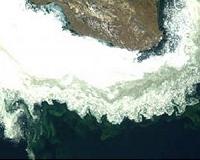 |
Potsdam, Germany (SPX) Mar 15, 2011 Unusually low temperatures in the Arctic ozone layer have recently initiated massive ozone depletion. The Arctic appears to be heading for a record loss of this trace gas that protects the Earth's surface against ultraviolet radiation from the sun. This result has been found by measurements carried out by an international network of over 30 ozone sounding stations spread all over the Arctic and Subarctic and coordinated by the Potsdam Research Unit of the Alfred Wegener Institute for Polar and Marine Research in the Helmholtz Association (AWI) in Germany. "Our measurements show that at the relevant altitudes about half of the ozone that was present above the Arctic has been destroyed over the past weeks," says AWI researcher Markus Rex, describing the current situation. "Since the conditions leading to this unusually rapid ozone depletion continue to prevail, we expect further depletion to occur." The changes observed at present may also have an impact outside the thinly populated Arctic. Air masses exposed to ozone loss above the Arctic tend to drift southwards later. Hence, due to reduced UV protection by the severely thinned ozone layer, episodes of high UV intensity may also occur in middle latitudes. "Special attention should thus be devoted to sufficient UV protection in spring this year," recommends Rex. Ozone is lost when breakdown products of anthropogenic chlorofluorocarbons (CFCs) are turned into aggressive, ozone destroying substances during exposure to extremely cold conditions. For several years now scientists have pointed to a connection between ozone loss and climate change, and particularly to the fact that in the Arctic stratosphere at about 20km altitude, where the ozone layer is, the coldest winters seem to have been getting colder and leading to larger ozone losses. "The current winter is a continuation of this development, which may indeed be connected to global warming," atmosphere researcher Rex explains the connection that appears paradoxical only at first glance. "To put it in a simplified manner, increasing greenhouse gas concentrations retain the Earth's thermal radiation at lower layers of the atmosphere, thus heating up these layers. Less of the heat radiation reaches the stratosphere, intensifying the cooling effect there." This cooling takes place in the ozone layer and can contribute to larger ozone depletion. "However, the complicated details of the interactions between the ozone layer and climate change haven't been completely understood yet and are the subject of current research projects," states Rex. The European Union finances this work in the RECONCILE project, a research programme supported with 3.5 million euros in which 16 research institutions from eight European countries are working towards improved understanding of the Arctic ozone layer. In the long term the ozone layer will recover thanks to extensive environmental policy measures enacted for its protection. This winter's likely record-breaking ozone loss does not alter this expectation. "By virtue of the long-term effect of the Montreal Protocol, significant ozone destruction will no longer occur during the second half of this century," explains Rex. The Montreal Protocol is an international treaty adopted under the UN umbrella in 1987 to protect the ozone layer and for all practical purposes bans the production of ozone-depleting chlorofluorocarbons (CFCs) worldwide today. CFCs released during prior decades however, will not vanish from the atmosphere until many decades from now. Until that time the fate of the Arctic ozone layer essentially depends on the temperature in the stratosphere at an altitude of around 20 km and is thus linked to the development of earth's climate.
Share This Article With Planet Earth
Related Links Alfred Wegener Institute for Polar and Marine Research Beyond the Ice Age
 Scripps Oceanography Researchers Discover Arctic Blooms Occurring Earlier
Scripps Oceanography Researchers Discover Arctic Blooms Occurring EarlierSan Diego CA (SPX) Mar 07, 2011 Warming temperatures and melting ice in the Arctic may be behind a progressively earlier bloom of a crucial annual marine event, and the shift could hold consequences for the entire food chain and carbon cycling in the region. Scientists at Scripps Institution of Oceanography at UC San Diego, along with colleagues in Portugal and Mexico, plotted the yearly spring bloom of phytoplankton-tin ... read more |
|
| The content herein, unless otherwise known to be public domain, are Copyright 1995-2010 - SpaceDaily. AFP and UPI Wire Stories are copyright Agence France-Presse and United Press International. ESA Portal Reports are copyright European Space Agency. All NASA sourced material is public domain. Additional copyrights may apply in whole or part to other bona fide parties. Advertising does not imply endorsement,agreement or approval of any opinions, statements or information provided by SpaceDaily on any Web page published or hosted by SpaceDaily. Privacy Statement |